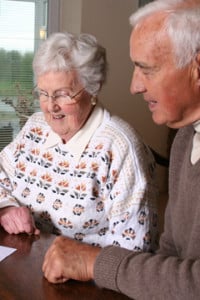
Nearly one-third of our seniors are veterans or surviving spouses of deceased veterans. According to the National Care Planning Council, approximately 25% of all seniors in the United States are eligible for up to $2,085 a month of additional income from the government to cover long term care costs. The program is so relatively unknown, however, that only about 5% of eligible seniors are actually receiving the benefit.
The benefits can be generous and are tax free. In 2014, the Improved Pension Benefit (which is often called “Aid and Attendance” or “Housebound” benefits) provides up to $1,759 per month to an unmarried veteran, $1,130 per month to a surviving spouse, or $2,085 per month to a married veteran and spouse.
Generally, veterans (or their surviving spouses) are eligible for Aid and Attendance or Housebound benefits if:
They were discharged from service under conditions other than dishonorable.
AND
They served at least ninety (90) days of active military service, one (1) day of which was during a period of war. (Generally, however, veterans who entered active duty after September 7, 1980, must have served at least 24 months or the full period for which they were called or ordered to serve.)
The “Periods of War” which have been defined by the Veterans Administration are as follows:
World War II
December 7, 1941, through December 31, 1946
Korean Conflict
June 27, 1950, through January 31, 1955
Vietnam Era
August 5, 1964, through May 7, 1975; and for veterans who served “in country” before August 5, 1964, February 28, 1961 through May 7, 1975
Gulf War
August 2, 1990 through a date to be set by law or Presidential Proclamation
The medical requirements for Improved Pension benefits are:
The veteran requires the aid of another person to perform the activities of daily living or to protect himself or herself from the hazards of the daily environment, OR
The veteran is bedridden, OR,
The veteran is a patient in a nursing home, OR,
The veteran is blind or nearly blind.
In addition to the medical requirements, there are income limits for a veteran to receive the enhanced pension. For 2014, for example, to receive a enhanced pension, a single veteran would have to be receiving income of $21,107 ($1,759 per month) or less.
The important thing to know about this income limit, however, is that it is adjusted for medical expenses. A married veteran, therefore, who meets the medical criteria and who is in an assisted living facility can often qualify for the full amount of the benefit, $2,085 a month.
Net worth is also critical in determining eligibility for the Improved Pension benefit. There is no set limit on how much a veteran may be worth, but net worth cannot be “excessive.”
Even though there is no published limit on net worth, the figure of $80,000 is often the beginning of the calculation. A net worth over $80,000 requires an examiner with the VA to justify the award of benefits.
Although there has been discussion at the federal level about adding a lookback period to disqualify any transfers of assets to (for example) a trust, no such lookback is presently in effect.
Seniors who are veterans and served 90 days on active duty and even one day during a wartime period, and their surviving spouses, should check on their eligibility for these benefits. The Improved Pension Benefit, combined with Social Security, can make the difference between being able to meet the expenses of an home care or an assisted living facility or not.

